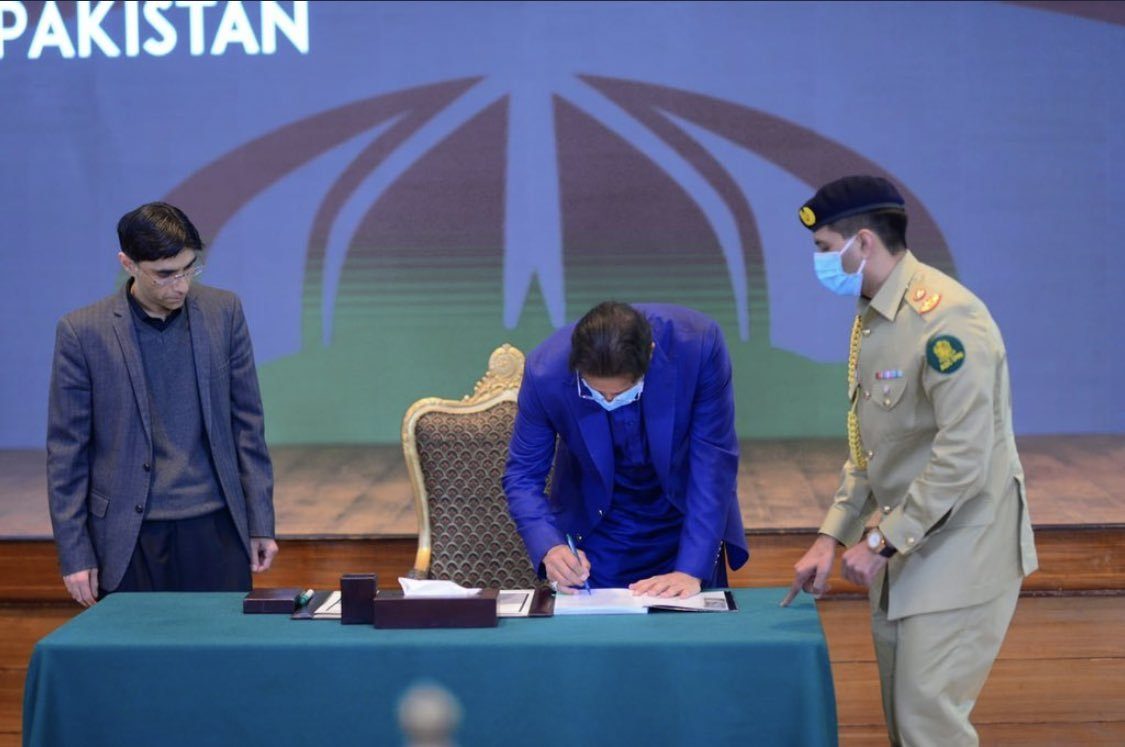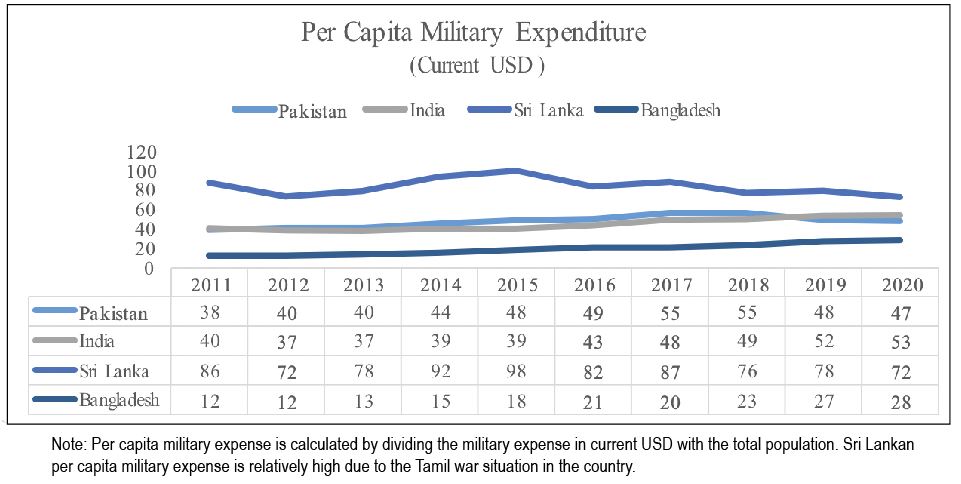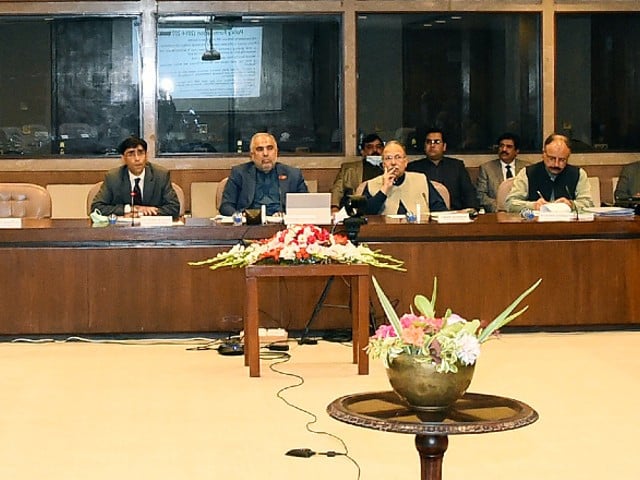Pakistan's new National Security Policy: Test lies in implementation
Experts see it as paradigm shift in country's 75-year checkered political history
Anadolu Agency
February 28, 2022
Speaker National Assembly Asad Qaiser presiding over the meeting of Parliamentary Committee on National Security at Parliament House in Islamabad. PHOTO: PID
KARACHI/SANGHAR: Pakistan's recently announced national security policy is undoubtedly a "paradigm shift" from the country's traditional military-dominated strategy to economic security, nonetheless, experts say the real challenge will be in putting the ambitious plan into action.
Islamabad announced its first-ever national security policy in January, prioritizing economic security over military security, though the South Asian nuclear state will stick to its traditional military security strategy in the face of rising tensions with longtime rival India.
Said Nazir, a retired officer and Islamabad-based security analyst, told Anadolu Agency that Islamabad, for the first time, is looking for "economic allies" in comparison to its decades-long policy of having military alliances, amid a string of economic compulsions.
"It's a paradigm shift from a traditional security-based policy to an economy-oriented policy," Nazir said, adding, "the old mantra was the security, security hardware, and security allies, but now the focus is on the economy and development projects like BRI (China's Belt and Road Initiative)."
"Now we are looking for economic alliances as the economy has long been our weak point," Nazir insisted, citing the example of the now-defunct Soviet Union, whose ultimate collapse was caused by a weak economy.
China and Pakistan are pursuing a $64 billion China Pakistan Economic Corridor (CPEC) project, which is part of Beijing's ambitious BRI – the project aims to connect China's strategically important northwestern Xinjiang province to the Gwadar port in southern Pakistan through a network of roads, railways, and pipelines to transport cargo, oil, and gas – which both US and India oppose for geopolitical reasons.
Syed Abrar Hussain, a former diplomat and vice chairman of the Institute of Policy Studies, an Islamabad-based think tank, holds a similar view, saying that the policy seeks to secure Pakistan's interests through political and economic diplomacy.
Real challenge
The newly announced policy, Hussain argued, will provide policymakers with a "sense of direction" in the future. However, the real test will be in its implementation.
"It will certainly provide some sense of direction and clarity of vision to the public in general and policymakers in particular, which was probably lacking in the past," Hussain, who served as Pakistan's ambassador to Afghanistan from 2014 to 2017, told Anadolu Agency.
Nonetheless, he asserted that the policy's implementation roadmap is lacking. At least it has not been made public, he said, adding that only half of the 110-page policy has been made public, with the rest kept confidential.
Echoing a similar view, Nazir said: "Keeping our track record in view, the real challenge will be the implementation of the policy itself."
The two experts' apprehensions coincide with a "consistent" inconsistency that has prevailed throughout the country's 75-year checkered political history, wherein every new government tried to change the policies of the previous regime.
In 2016 the last government of three-time Prime Minister Nawaz Sharif introduced a National Action Plan to combat terrorism in the country following a terrorist attack that killed over 150 people, mostly students, at a military-run school in the northwestern city of Peshawar. Currently, the plan exists only on paper.
"Out of 20 points (of the National Action Plan), 13 were fully addressed, but not implemented in letter and spirit, whereas seven were either partially or little implemented," he asserted, claiming that counter-terrorism institutions such as the National Counter Terrorism Authority and Joint Intelligence Directorate are "either in limbo or nowhere in sight."
Regional security
Another highlight of the new security policy, according to Nazir, is that it is no longer "India-centric but economy-oriented."
However, he said he does not believe that this shift will have a positive impact on the strained relations between the two nuclear neighbors.
Citing the scrapping of Indian-administered Kashmir's decades-long semi-autonomous status and a controversial citizenship law targeting Muslims, Nazir sees remote chances for the resumption of long-stalled talks between the two countries, particularly in the presence of Narendra Modi's Bharatiya Janata Party (BJP) government.
"The two countries are expected to stay locked in an already intensifying arms race as both countries stick to their traditional stances, with Pakistan calling for a reversal of August 2019 action, whereas India is not ready to even talk about it."
J Jeganaathan, head of the National Security Studies Department at the Central University of Jammu, sees no immediate thaw in Islamabad-New Delhi relations.
"I don't think there are chances for the resumption of talks, at least in the immediate future, not just because in the context of this policy, but the sheer reality that Pakistan's stance towards Kashmir appears to remain unchanged," he told Anadolu Agency.
The policy document, he argued, highlighted Islamabad's traditional intention to improve ties with New Delhi by keeping the Kashmir issue at the center of its national security policy, "which is nothing more than a mere reflection of suicidal tendencies."
Products of accidents
Former Indian Foreign Minister Yashwant Sinha expressed skepticism about the resumption of talks between India and Pakistan anytime soon.
He observed that the two countries' relationship and talks have been accidental.
"Someone suggests that we talk, and both countries agree. They talk, but nothing comes of it. Then, once again, one country says, we will not talk, and talks are halted for an extended period of time. So, both countries must abandon that tactic or strategy," Sinha, who served as minister of external affairs from 2002 to 2004, told Anadolu Agency.
He was a senior leader of the ruling BJP before resigning in 2018. In March 2021, he joined the All India Trinamool Congress.
"There should be no preconditions from their side and no conditions from our side, and then let's talk."
"They (Pakistan) can't unilaterally decide what the core issue is, and that's where the problem is,"
"I don't think India has ever agreed (on anything). Pakistan keeps talking about J&K (Jammu and Kashmir) as the core issue. There is a composite or comprehensive dialogue framework that has identified eight issues, including Jammu and Kashmir, as well as terrorism, which is a concern for India," Sinha said.
So, he suggested any talks with Pakistan should be based on those eight issues, which include trade and other issues.












